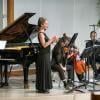
Pianist Igor Levit’s 2023 San Francisco Symphony artist-in-residence activity is about to climax with two weeks of performances, June 15–27, that include orchestral concerts led by Music Director Esa-Pekka Salonen.
The highlights of this series are Beethoven’s Piano Concerto No. 5 (June 15–17) and Ferruccio Busoni’s Piano Concerto (June 22–25). Levit’s performances also include a chamber music concert with members of the orchestra on June 18 and a solo recital on June 27.
The Busoni Piano Concerto, completed in 1904, is a challenge to the pianist, the orchestra, the chorus (yes, chorus in a piano concerto), and the audience. At 75 minutes, this longest of known piano concertos will have its first SF Symphony performances next week, a rare opportunity to experience this bucket-list composition.
Busoni’s view of music indicates the nature of his work: “Our art is a theater of surprise and invention, and of the seemingly unprepared. The spirit of music arises from the depths of our humanity and is returned to the high regions whence it has descended on mankind.”

Of the many descriptions of the composer’s piano concerto over the years, Lloyd Schwartz’s review on NPR’s Fresh Air sums it up:
“It’s a fascinating concoction of the serious and the fabulous, the solemn and the pyrotechnic. A concerto not even in the usual three or even four movements, this one is in five, ending with a men’s chorus singing, in German, a Danish poem about spiritual transcendence.
“Each movement holds new surprises,” Schwartz wrote. “The first movement is essentially solemn, almost religious in its long-range Wagnerian unfolding. But the second movement is marked playful. The massive third movement depicts a profound crisis.
“A whirlwind tarantella … follows that calm. Finally, with [the] last choral movement — Busoni calls it a canticle — you feel as if you’ve been through some large spiritual adventure.”
One of Busoni’s directions that will not be followed for next week’s performances at Davies Symphony Hall is described by conductor Mark Elder:
“Busoni had the idea that the chorus should be naked. Because the texts they sing are the words from [Adam] Oehlenschläger’s play Aladdin, and the men are the singing pillars in Aladdin’s cave, he wanted the men to be either naked or invisible.
“Of course at the Albert Hall [for the 1988 BBC Proms], we could put them up in the gallery, and it made a very striking effect because nobody knew they were there.”
In advance of the fully clothed SF Symphony performances, Levit welcomed the orchestra’s invitation to a residency: “Few things nowadays make me so happy than thinking forward to playing with the San Francisco Symphony and Esa-Pekka so extensively.
“Especially when part of the program will be Busoni’s magnificent, heroic, huge, long, mounting, and really incredible piano concerto. Playing this piece doesn’t happen too often, and getting the chance to play it with such a great orchestra and such a great conductor, in a way, leaves me speechless.”

Salonen responded: “Igor Levit is perhaps the hottest pianist in Europe at the moment. He plays the piano on a supreme technical and musical level, and when he touches an old warhorse piece, like a Beethoven piano concerto or a Brahms piano sonata, it’s almost like he’s a brilliant restorer of old paintings. He treats these paintings with utmost care and respect, but somehow the colors become vivid. It’s a really magical touch he has in this sense.
“And I’m so especially excited that Igor has decided to play the Busoni Piano Concerto with us, which is the strangest piano concerto ever written. … It’s a massive but utterly fascinating journey, full of beauty, struggle, love, and pain.”
This may be the only piano concerto with a chorus, but it was Beethoven who first included a chorus in a concert work for piano and orchestra, his Choral Fantasy, Op. 80 (1808), well ahead of the Ninth Symphony.
Since then, only a handful of works have been scored for similar forces, including Daniel Steibelt’s Piano Concerto No. 8 (1820) and Henri Herz’s Piano Concerto No. 6, Op. 192 (1858).
A broadcast of the Busoni performances will air on July 4 at 8 p.m. on Classical KDFC — 90.3 FM San Francisco, 104.9 FM San José, 89.9 FM Napa, and online, where it will be available for on-demand streaming for 21 days following the broadcast.




